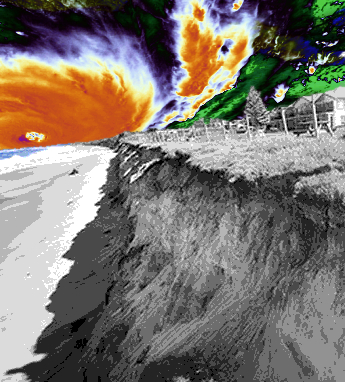Sea level rise highest in centuries
 Updated modelling shows global sea level rose faster in the 20th century than in any of the 27 previous centuries.
Updated modelling shows global sea level rose faster in the 20th century than in any of the 27 previous centuries.
Additionally, the research suggests that without global warming, global sea level would have risen by less than half the observed 20th century increase, and could even have fallen.
But instead, global sea level increased by about 14 cm from 1900 to 2000 – a big jump for vulnerable, low-lying coastal areas.
“The 20th century rise was extraordinary in the context of the last three millennia - and the rise over the last two decades has been even faster,” said Robert Kopp, the lead author and an associate professor in Rutgers University's Department of Earth and Planetary Sciences.
The study is published in the latest Proceedings of the National Academy of Sciences.
It used an advanced new statistical approach developed over several years by Kopp's team and colleagues at Harvard University.
“No local record measures global sea level,” Kopp said.
“Each measures sea level at a particular location, where it is buffeted by a variety of processes that cause it to differ from the global mean. The statistical challenge is to pull out the global signal. That's what our statistical approach allows us to do.”
One intriguing find was that global sea level declined by about 8 cm from 1000 to 1400, at a time when the planet cooled by about 0.2°C.
By comparison, global average temperature today is about 1°C higher than it was in the late 19th century.
“It is striking that we see this sea-level change associated with this slight global cooling,” Kopp said.
But such far-reaching and detailed analysis is only as good as the data it is built upon.
For this project, the team compiled a new database of geological sea-level indicators from marshes, coral atolls and archaeological sites spanning the last 3,000 years.
The database included records from 24 locations around the world, as well as 66 tide-gauge records from the last 300 years.
“As geologists, we can reconstruct how sea level changed at a particular site, and progress in the last 10 years has allowed us to do so with ever more detail and resolution,” said Andrew Kemp, study co-author and assistant professor of earth and ocean sciences at Tufts University.
“Gathering together and standardising these reconstructions gave us a chance to look at what they had in common and where they differed, both of which can tell us about the causes of past, present and future sea-level change.”
The study predicts that global sea level will rise by 50 cm to 130 cm in the 21st Century, if fossil fuel use remains as heavy as it is.
The experts estimate that removing fossil fuels would reduce the rise to between 25 cm and 60 cm.
The same database and similar analytical techniques were used in a companion study by Kopp's collaborators Klaus Bittermann and Stefan Rahmstorf at the Potsdam Institute for Climate Impact Research in Germany.
The spin-off study calculated how temperatures relate to the rate of sea-level change, and found that without global warming, 20th century global sea-level change would have been between a 3 cm decrease and a rise of 7 cm.
It also found that without the sea-level rise from global warming, over half of the 8,000 coastal nuisance floods picked up at US tide gauge sites since 1950 would not have occurred.







 Print
Print